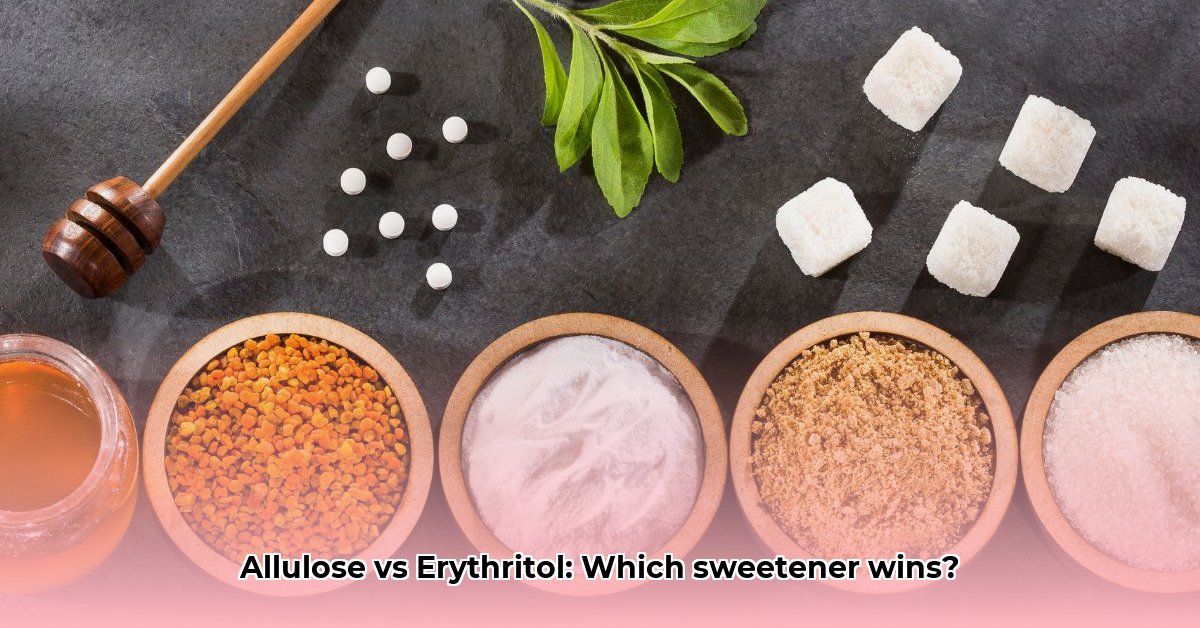Confused about allulose and erythritol? They’re both popular sugar substitutes for low-carb diets, but which one is right for you? This article breaks down the good, the bad, and the sugary (or not-so-sugary!) aspects of both. We’ll compare sweetness, blood sugar effects, potential downsides, and baking performance. Think of it as a head-to-head battle, with science as the referee, to help you choose the best sweetener for your lifestyle. We’ll cover everything from chemical makeup to practical tips for your kitchen. For more on natural sweeteners, check out this article on agave alternatives. Get ready to become a low-carb sweetener expert!
Allulose vs Erythritol: Which Low-Carb Sweetener Wins? Exploring the Best Sugar Alternative
Choosing a sugar substitute when you’re watching your carb intake can feel like navigating a minefield. Allulose and erythritol are two popular contenders, both promising minimal impact on blood sugar and calorie count. But which one best fits your lifestyle and taste buds? Let’s break it down in an easy-to-understand way. According to the CDC, approximately 37.3 million Americans, or 11.3% of the U.S. population, had diabetes in 2019. This highlights the importance of finding suitable sugar alternatives.
Allulose: The Gentle Giant of Sweeteners
Imagine a sugar that tastes almost exactly like regular sugar, but with a fraction of the calories. That’s allulose! It’s a naturally occurring monosaccharide found in tiny amounts in fruits like figs, raisins, and jackfruit. It’s also known as D-psicose. Think of it as a distant relative of table sugar; similar structure, similar sweetness, but a much gentler impact on your body. The reason for this gentler touch? Your body doesn’t fully process allulose, meaning you absorb only about 0.4 calories per gram. That’s significantly less than regular sugar’s 4 calories per gram! While you can find it naturally, commercially, it’s often derived from corn.
Allulose: The Good, The Bad, and The Unknown
Pros:
- Sweet Success: Tastes incredibly similar to regular sugar, making it a perfect 1:1 replacement in recipes.
- Baking Buddy: It browns and textures beautifully when baking, behaving much like regular sugar, a huge plus for low-carb bakers.
- Generally Well-Tolerated: Most people experience minimal digestive upset when consuming allulose in moderation, though some may experience bloating or gas with larger quantities.
- Potential Health Benefits: Emerging research suggests allulose may have anti-inflammatory properties and could aid in weight management for individuals with obesity or type 2 diabetes.
Cons:
- Pricey Pleasure: Compared to other sugar alternatives like erythritol, allulose can be on the higher end of the price spectrum.
- Calorie Content: While low, it still contains some calories, unlike erythritol, which is virtually calorie-free.
- Long-term Research Needed: While initial studies look promising, more research is needed into the long-term health effects of allulose consumption.
- Availability: Allulose may not be as widely available in stores as other common sweeteners like erythritol.
Erythritol: The Zero-Calorie Contender
Erythritol is a sugar alcohol, a naturally occurring substance you’ll find in small amounts in some fruits and fermented foods. However, the erythritol you find in most products today is made through a fermentation process, often using corn. The key difference between erythritol and allulose? Your body absorbs erythritol, but it doesn’t fully metabolize it, leading to a near-zero calorie count (around 0.24 calories per gram). Think of it as a sugar that passes right through you, leaving minimal impact on your body. Sugar alcohols like erythritol are often used in sugar-free gums, candies, and even some beverages.
Erythritol: Weighing the Ups and Downs
Pros:
- Zero (Almost) Calories: Makes it a very attractive option for those strictly controlling calorie intake and seeking weight management.
- Cost-Effective Choice: Generally more affordable and widely available than allulose.
- Good for Dental Health: Studies suggest erythritol may inhibit the growth of Streptococcus mutans, a bacterium that contributes to plaque formation, thus promoting oral health.
- Widely Tolerated (Usually): Most people tolerate it well in moderate amounts.
Cons:
- The Cooling Effect: Erythritol can cause a slight cooling sensation, impacting the taste of your food or drinks. Some people find this pleasant, others find it off-putting.
- Potential for Digestive Discomfort: While infrequent, excessive consumption might trigger digestive upsets like gas, bloating, or diarrhea, particularly in sensitive individuals.
- Aftertaste: Some people find a slightly bitter aftertaste, a factor to consider when choosing a sweetener. It’s often blended with other sweeteners to mitigate this.
- Crystallization: Erythritol can sometimes crystallize in baked goods, leading to a slightly gritty texture.
Allulose vs. Erythritol: A Side-by-Side Look
Let’s summarize the key differences:
| Feature | Allulose | Erythritol |
|---|---|---|
| Sweetness | About 70% as sweet as sugar | About 70% as sweet as sugar |
| Calories/gram | ~0.4 kcal | ~0.24 kcal |
| Glycemic Index | Low | Virtually zero |
| Digestive Issues | Generally low risk | Potential for issues with high intake |
| Baking Properties | Excellent, mimics sugar well | Can crystallize; cooling effect |
| Cost | Typically more expensive | More affordable and widely available |
| Natural Sources | Figs, raisins, jackfruit | Some fruits and fermented foods |
Real-World Considerations and Safety
Both sweeteners generally receive a thumbs-up from health authorities regarding safety, but remember, moderation is key. Everybody’s body reacts differently. Start with small amounts to observe any effects. Allulose shines in baking; its ability to mimic sugar’s behavior makes it ideal for sweets and baked goods. Erythritol tends to work best in drinks and recipes where a subtle, cooling sensation isn’t a problem. Think refreshing summer beverages or icy desserts. Price and availability are huge factors to consider as well. Erythritol typically wins the affordability game. Are you willing to pay a premium for a more sugar-like baking experience?
Making the Right Choice for You
The “best” sweetener depends on your individual needs and preferences. Are you a baker who values near-perfect sugar mimicry? Allulose might be your best bet. Are you focused on cutting calories as much as possible and are happy with a mild cooling sensation? Erythritol may be more up your alley. The exciting part? You can try both and see which one becomes your new go-to low-carb sweetener! Remember to listen to your body and adjust your intake accordingly. The world of low-carb sweetening is still evolving, so keep an eye out for new research and discoveries as they emerge.
How Do Erythritol and Allulose Impact the Gut Microbiome Long-Term?
Key Takeaways:
- Allulose and erythritol, low-calorie sweeteners, show potential for influencing gut health, particularly by potentially modulating the gut microbiota (although the evidence is still evolving).
- Both sweeteners are generally considered safe and have a minimal impact on blood sugar levels.
- The extent of their influence on the gut microbiome likely varies depending on factors like dosage, individual gut composition, and study methodology; more research is needed.
Understanding Allulose and its Potential Effects on Gut Health
Allulose, as discussed, is a rare sugar found naturally in small amounts in certain fruits. It’s absorbed poorly in the small intestine, meaning a larger proportion reaches the large intestine, where the gut microbiota resides. This leads to the hypothesis that allulose could act as a prebiotic, potentially influencing the composition and activity of the gut microbiota. While some in vitro and animal studies have suggested that allulose may promote the growth of beneficial bacteria, particularly those that produce butyrate, human studies are needed to confirm these findings definitively and to assess how does erythritol and allulose impact gut microbiome long-term.
Exploring Erythritol and its Potential Impact on the Gut
Erythritol is another sweetener that is largely undigested in the upper digestive tract. Some studies have investigated its effects on the gut microbiome. As with allulose, the results are mixed and depend on factors like dosage and the individual’s gut composition. Some studies suggest a minimal impact, while others suggest that erythritol may selectively promote the growth of certain bacterial species or influence the production of short-chain fatty acids. The question of how does erythritol and allulose impact gut microbiome long-term requires further investigation through well-designed human trials. Butyrate, a short-chain fatty acid, is crucial for colon health.
Allulose vs. Erythritol: A Microbiome Comparison
| Feature | Allulose | Erythritol |
|---|---|---|
- Why Am I Always Thinking About Food? Your Body and Brain Explain - February 2, 2026
- Healthy Eating Is About Quality, Not Just Calories - February 1, 2026
- Healthy Living Products to Elevate Your Wellness Routine - January 31, 2026










